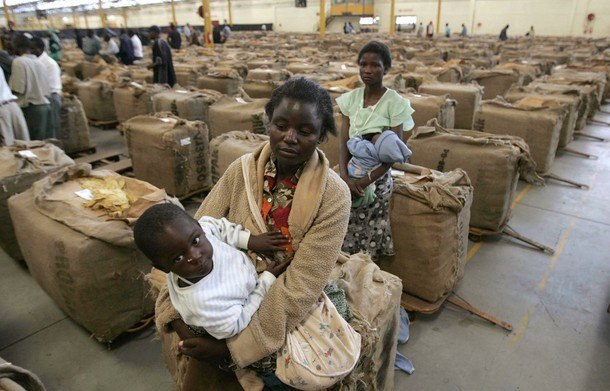
Tobacco farmers have expressed dissatisfaction with the low prices offered for their crop this season despite having surpassed the 210 million kg mark this year.
By Kudzai Chimhangwa
Statistics availed by the Tobacco Industry Marketing Board (TIMB) show that the average price per kg this season stood at US$3,17 as compared to US$3,69 last year.
The average number of rejected bales increased by 15% to 135 271 bales this season.
A total of 216 078kg of the golden leaf went under the hammer at an average price of US$1,40 per kg at the mop-up sales that took place at two of the country’s auction floors between Tuesday and Wednesday last week.
Auction sales closed on June 27 and the clean-up sales were conducted to mop up tobacco remaining on farms.
Tempers flared during the selling season at the various tobacco auction floors in Harare where angry growers said they were being fleeced by dubious buyers.
The farmers claimed that prices, which ranged from as low as US$0,60c to around US$3 per kg, were ridiculous as some corrupt individuals sought to profiteer from their hard work.
- Minister bemoans shortage of schools
- BCC joins Green Cities initiative
- Drunkard kills church pastor
- DripSol’s one-stop-shop for farmers opens doors
Keep Reading
Anti-riot police had to be called in as the situation remained tense.
Zimbabwe Farmers Union president Silas Hungwe was at a loss of words with regard to the low prices offered to farmers.
“Basically there is no use talking about it. We believe it is government’s responsibility to take care of its farmers and we continue to hope that we get assistance,” said Hungwe.
“We grow tobacco using methods that we are used to and we will continue to do so because we need to survive even though we may not be taken seriously.”
However, TIMB statistics show that contract tobacco prices remained relatively good at an average US$3,32 with a minimal rejection percentage of 3,33%.
Boka Tobacco Auction Floors chief executive officer Rudo Boka recently told Parliament that contractors were grabbing 70% of tobacco business and called for the drawing up of legislation aimed at controlling contract farming.
Contracted farmers felt that the auction system was shortchanging them as there was no value added in the process of selling their crop at the auction floors.
Under contract farming, with ZLT for example, growers pay an interest rate of 7%, are provided with cheaper inputs and obtain free expert services besides a better price for the crop.
Zimbabwe Commercial Farmers’ Union president Wonder Chabikwa also expressed disappointment with prices this season.
“This year we are not happy with the prices that were on offer for the crop. The prices were very disappointing especially auction floor prices,” said Chabikwa.
He said farmers were particularly unhappy as they failed to meet the expected profit margins and quite a number would find it difficult to revamp operations.
“We can’t say the low prices were attributed to quality. In fact the very same quality of tobacco when sold to contractors was bought at far better prices.”
TIMB chief executive officer Andrew Matibiri however said good quality crop did fetch high prices.
“The Chinese used to buy low quality tobacco, but they have since stopped buying lower leaves. They now prefer tobacco from the upper plant. Obviously with increased tobacco volumes, buyers tend to become choosy so this is what basically explains this situation,” said Matibiri.
Turning to the issue of contract tobacco regulation, Matibiri said the country was undergoing challenging economic times where banks did not have money for lending to farmers due to the liquidity crunch.
“It has never been our intention to stifle any tobacco buying system, be it contract or auction,” he said.











